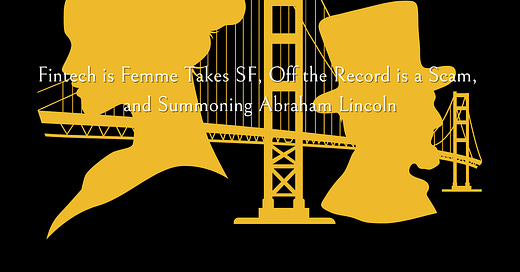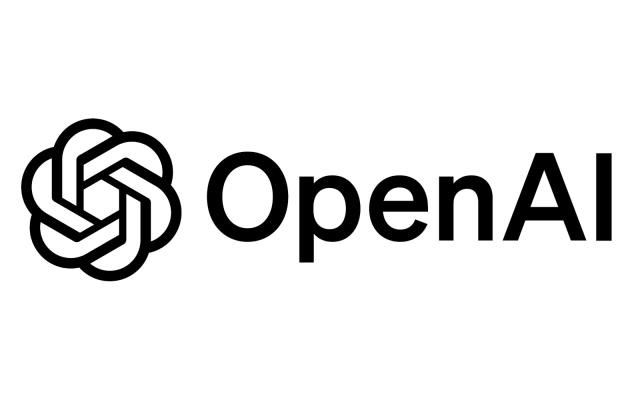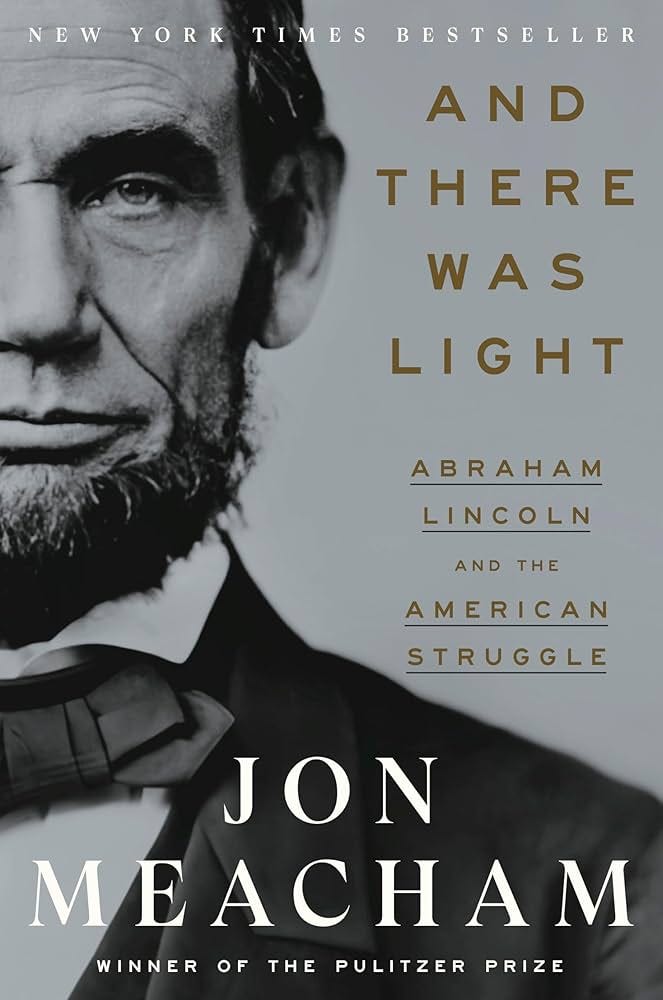Fintech is Femme Takes SF, Off the Record is a Scam, and Summoning Abraham Lincoln
This past week my co-founder and I made the trek up to San Francisco to attend the Fintech is Femme Leadership Summit, hosted by Fintech is Femme Founder and longtime reporter Nicole Casperson.
Coming off a fraught week and post-election nerves, it was an exciting opportunity to connect with the real movers and shakers in fintech, the women who are pushing fintech futures for women forward – regardless if the world is on our side or not.
(And spoiler alert, they usually aren’t.)
The message was loud and clear – that women need to support women. But it wasn’t just an ethereal kumbaya message that we’ve all heard before. The conference was grounded in real connections, investors who invest in female-led fintechs, hiring managers, and founders who have survived, scaled, and succeeded despite all odds with real action steps for the women who are trying to make a difference in this space.
And the truth is, if you make a difference in finance, you make a difference for the whole world. As long as the world runs on money, the more of a hand women have in fintech – from writing checks, to founding groundbreaking companies – the more we can bend the world to our will.
One of the many, many reasons I have always loved and deeply believed in fintech.
While female founders are planning their next moves in the light of much uncertainty, the “business as usual” financial press is trying to evaluate what the incoming administration means for fintech as a whole.
Of course, much remains to be seen, but if previous years are any indication, we can expect regulations on the industry to ease up, loosening the neck on corporate interests and banking in general, while consumer protection activity will most likely decrease. Agencies like the Consumer Financial Protection Bureau (CFPB) are incredibly active under Democrat administrations, who prioritize consumer protections and lower-fees.
We can expect these agencies to be pulling back on activity. So consumers, make sure you’re reading the fine print.
After a fraught (understatement) few years in fintech, it will be interesting to say the least how the new administration affects the fintech plane, when it’s so desperately overdue for a safe landing.
Funded & Featured
Open Funding Season for OpenAI with $6.6B Raise
First, nobody had a better funding month (actually, make that a funding year) than OpenAI.
While the rest of the world was focused on the election and fighting openly on social media, OpenAI was cleaning up in the funding world, putting to bed any concern that they would not continue to be the leading (and most visible) force in AI development – for better or worse.
This much anticipated raise was led by Thrive Capital – one that was much anticipated and one that outraised Elon Musk’s xAI, which announced a $6B raise back in May.
ChatGPT arguably ushered in a new tangible way that “everyday” people could experience AI as a helper – and perhaps the accessibility of ChatGPT is what made AI a household name, put a positive spin on artificial intelligence and made Founder Sam Altman a star in ways that other AI founders are not.
The plus side (and possible downside) of Sam Altman’s fame is that his name and value are synonymous with OpenAI’s name and value. Investors know that, which is part of the risk and the reward.
With that being said, the deal does seem to take Sam’s position and current OpenAI restructuring (from nonprofit to for-profit) into account with a clause that allows investors to ask for their money back if the changes and restructuring is not complete within the next two years.
Regardless of the deal structure, or what remains to be seen over at OpenAI is that this new $6.6B deal proves that Sam Altman and ChatGPT are at the top of the AI food chain, and not even Elon can slow them down.
Hot off the Press
From the Pink Shark PR Newsroom:
Credibly, the lending platform that champions small- and medium-sized business was featured on the Fintech Impact podcast, interviewing Credibly co-CEO and Founder, Ryan Rosett highlighting Credibly’s deep work with GenAI in the small business lending space.
TomoCredit, a financial wellness platform that helps immigrants and other underserved groups get access to essential credit was featured in GoBankingRates, sharing insights on why GenZ maxes out their credit cards – and what they can do about it.
Gehtsoft, an agile-focused software development firm was a guest contributor for the Plaky blog, breaking down what a product backlog is and how software developers can build one.
Want to see how Pink Shark PR can help create media buzz like this for your company? Media buzz that leads to better brand awareness, steady customer acquisition, and investor dollars and cents? Get in touch with us over at Pink Shark PR and start building a public presence that dominates your industry.
Weekly PR Wisdom
One of my clients asked me a simple (but incredibly important) question this week that inspired an entire Linkedin discussion around one of the most commonly misunderstood terms in PR.
Off the record.
Most people assume that if you tell a reporter “off the record” that automatically protects you from being quoted and that the reporter is now obligated to keep your statement off the record. But, an off the record agreement doesn’t work like “no backsies” and requires consent.
So, how does off the record actually work? Here are a few tips to keep in mind – and to keep your public comms safe.
You’re Never Really Off The Record
Nothing is full-proof and off-the record is not a guarantee that something won’t slip (either intentionally or unintentionally) and while most reporters do uphold journalistic standards and ethics, the minute you share information you should not be sharing, you’re putting yourself and your brand in a vulnerable position. Reporters are human and cannot unhear what you’ve just shared, so an “off the record” moment can color the context and flavor of an article (and not always in your favor).
Sometimes things accidentally slip out, or sometimes the clarity around what they can and cannot share gets muddled. There are a million reasons why “off the record” is not fool proof, and so if the information that you’re sharing with the reporter could come back and bite you in the know-you-what, my advice is to keep your mouth shut.
Off The Record Requires Consent
Like I mentioned, the misconception is that off the record works like a game of no backsies. That once you say “off the record” the reporter is entitled to comply. Not so fast. They have to agree to off the record before you divulge any information.
In an email, or in conversation, that means you would have to ask directly “I would like to share some information off the record, do you agree?” And then at this point, they would have to agree that this next part of the conversation is off the record, and non-admissible for the interview. At that point you would then offer the information. I do prefer to have something in writing that shows they agreed to off the record (i.e. email) but you can also use this in a phone or Zoom interview as well.
Just make sure it’s recorded.
The One Occasional Exception
Someone asked me if there’s ever an exception to “you’re always on the record” and of course there is (there’s always an exception, right?). But again, this isn’t a quick answer or a fast way to safely and impulsively unload information.
I only recommend going “off the record” with reporters you already trust, and have already built a working relationship with. This means genuine rapport has been built and you feel like they have always represented you in the media fairly and positively. This means a first time interview is always a no-go for any kind of confidential disclosure.
And even in this case the only time that you should ever divulge information is if the reward outweighs the risk. Meaning that the information is so important contextually to the reporter’s story that it can significantly alter the reporting in your favor.
If it doesn’t do that, don’t say anything you might end up regretting.
While there are certainly industry rules (and protections) to “off the record,” the general wisdom to keep in mind is that if you don’t ever want to see it printed (or aired), do not say it.
From Our Library
Book: And Then There Was Light: Abraham Lincoln and The American Struggle
By: Jon Meacham
Pulitzer Prize winning author, historian, and presidential biographer Jon Meacham has crafted a book as intricate and complicated as Lincoln himself – a history book that feels deeply relevant to the divided times we are living in now.
This book, which was a Christmas gift from my business partner last year, is an intimate look at what made Lincoln so complex, progressive but also stubbornly conservative in the root of his progressive ideals. An up close and personal look at the complicated and often conflicting views that Lincoln held about slavery and racism - too progressive for the Southern economy which was actually trying to push the American slave trade into Mexico and Central America to expand profits, but also not progressive enough for all abolitionists.
Frederick Douglass praised Lincoln, while Horace Graley (and many other abolitionists) did not. He was an image of division in almost every circle he affected.
To be profoundly anti-slavery since childhood, but not an abolitionist. To be too progressive, but not progressive enough. To be the one who fiercely believes in setting slaves free - and yet upholding standards of white supremacy in Washington. The book argues that Lincoln is somewhat misplaced for the times.
He was radical and simultaneously not radical enough - and yet that was his superpower, when it came to actually getting things done. And while everyone had something to criticize Abraham Lincoln for (the South deeply hating him) he enacted more change, freed the enslaved, and broke apart a slave-driven economy that nobody thought possible to destroy.
Surprisingly, the best part of this book however, isn’t necessarily what Lincoln did. It’s that it leaves the reader wondering what Lincoln would have done if he had lived. If the United States had more time with a man who was willing to radically shift his views as much as one can when thrust into the center of division.
If Lincoln had lived, what would he have done next? How would we feel that impact even now in a deeply divided country on race, socio-economic politics, identity politics and class warfare?
Somehow, this book will make you miss “what could have been” and it’s rare to read a biography that doesn’t just fill you with a deep sense of inspiration, but one that encapsulates also, the magnitude of deep loss.
Make Headlines - Work With Us!
If you want to know how to get $3M+ in advertising exposure via earned (free) media coverage with better results than paid advertising and more brand awareness than your competitors, drop me a line at jenny@pinksharkpr.com or say ”hello" at our website Pink Shark PR.







